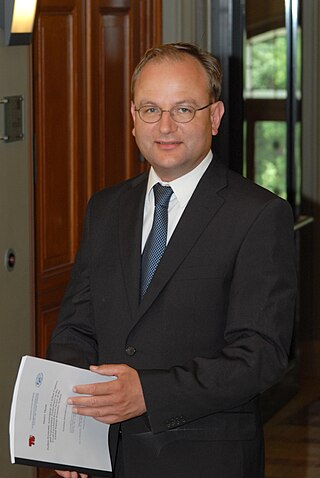Related Research Articles

The International Monetary Fund (IMF) is a major financial agency of the United Nations, and an international financial institution funded by 190 member countries, with headquarters in Washington, D.C. It is regarded as the global lender of last resort to national governments, and a leading supporter of exchange-rate stability. Its stated mission is "working to foster global monetary cooperation, secure financial stability, facilitate international trade, promote high employment and sustainable economic growth, and reduce poverty around the world." Established on December 27, 1945 at the Bretton Woods Conference, primarily according to the ideas of Harry Dexter White and John Maynard Keynes, it started with 29 member countries and the goal of reconstructing the international monetary system after World War II. It now plays a central role in the management of balance of payments difficulties and international financial crises. Through a quota system, countries contribute funds to a pool from which countries can borrow if they experience balance of payments problems. As of 2016, the fund had SDR 477 billion.

The euro area, commonly called the eurozone (EZ), is a currency union of 20 member states of the European Union (EU) that have adopted the euro (€) as their primary currency and sole legal tender, and have thus fully implemented EMU policies.

Monetary policy is the policy adopted by the monetary authority of a nation to affect monetary and other financial conditions to accomplish broader objectives like high employment and price stability. Further purposes of a monetary policy may be to contribute to economic stability or to maintain predictable exchange rates with other currencies. Today most central banks in developed countries conduct their monetary policy within an inflation targeting framework, whereas the monetary policies of most developing countries' central banks target some kind of a fixed exchange rate system. A third monetary policy strategy, targeting the money supply, was widely followed during the 1980s, but has diminished in popularity since that, though it is still the official strategy in a number of emerging economies.
Bruegel is a think tank devoted to policy research on economic issues. Based in Brussels, it launched its operations in 2005 and currently conducts research in five different focus areas with the aim of improving economic debate and policy-making.

Leszek Henryk Balcerowicz is a Polish economist, statesman, and Professor at Warsaw School of Economics. He served as Chairman of the National Bank of Poland (2001–2007) and twice as Deputy Prime Minister of Poland.

In economic policy, austerity is a set of political-economic policies that aim to reduce government budget deficits through spending cuts, tax increases, or a combination of both. There are three primary types of austerity measures: higher taxes to fund spending, raising taxes while cutting spending, and lower taxes and lower government spending. Austerity measures are often used by governments that find it difficult to borrow or meet their existing obligations to pay back loans. The measures are meant to reduce the budget deficit by bringing government revenues closer to expenditures. Proponents of these measures state that this reduces the amount of borrowing required and may also demonstrate a government's fiscal discipline to creditors and credit rating agencies and make borrowing easier and cheaper as a result.

Beatrice Weder di Mauro is a Swiss economist who is currently Professor of economics at the Graduate Institute of International and Development Studies in Geneva, Research Professor and Distinguished Fellow-in-residence at the Emerging Markets Institute of INSEAD Singapore, and senior fellow at the Asian Bureau of Finance and Economic Research (ABFER). Since 2018, she also serves as President of the Centre for Economic Policy Research (CEPR).

Ottmar Georg Edenhofer is a German economist who is regarded as one of the world's leading experts on climate change policy, environmental and energy policy, and energy economics. His work has been heavily cited. Edenhofer currently holds the professorship of the Economics of Climate Change at the Technical University of Berlin. Together with Earth scientist Johan Rockström, economist Ottmar Edenhofer is scientific director of the Potsdam Institute for Climate Impact Research (PIK), representing the interdisciplinary and solutions-oriented approach of the institute. Furthermore, he is director of the Mercator Research Institute on Global Commons and Climate Change (MCC). From 2008 to 2015 he served as one of the co-chairs of the Intergovernmental Panel on Climate Change (IPCC) Working Group III "Mitigation of Climate Change".

Lúcio Vinhas de Souza is a Brazilian-Portuguese economist. His main research areas are global macroeconomics, development economics, monetary economics, finance and country risk, with extensive work experience at the developed economies of the European Union and the US, and in several emerging market regions, from the former Soviet Union to East Asia, Africa and Latin America.

Markus Konrad Brunnermeier is an economist, who is the Edwards S. Sanford Professor of Economics at Princeton University.

Marcel Fratzscher is a German economist and professor at Humboldt-University of Berlin. Since February 2013 he has been president of the Berlin-based economic research institute DIW Berlin. He was previously head of International Policy Analysis at the European Central Bank. He also teaches International Finance in the Ph.D. programme in Economics at Goethe University Frankfurt.

Fiscal union is the integration of the fiscal policy of nations or states. In a fiscal union, decisions about the collection and expenditure of taxes are taken by common institutions, shared by the participating governments. A fiscal union does not imply the centralisation of spending and tax decisions at the supranational level. Centralisation of these decisions would open up not only the possibility of inherent risk sharing through the supranational tax and transfer system but also economic stabilisation through debt management at the supranational level. Proper management would reduce the effects of asymmetric shocks that would be shared both with other countries and with future generations. Fiscal union also implies that the debt would be financed not by individual countries but by a common bond.

Peter Praet is a Belgian economist who served as a member of the Executive Board of the European Central Bank from 2011 to 2019 and concurrently as ECB chief economist following his 2012 appointment.

Jakob von Weizsäcker is a German economist and politician of the Social Democratic Party (SPD) who has been serving as State Minister of Finance in the government of Minister-President of the Saarland Anke Rehlinger since the 2022 state elections.

Nicoletta Batini is an Italian economist, notable as a scholar of innovative monetary and fiscal policy practices. During the crisis she pioneered the IMF work exposing the dangers of excessive fiscal austerity and designed ways to consolidate public debt successfully during phases of financial deleveraging. Since 2003 at the International Monetary Fund, she has served as Advisor of the Bank of England’s Monetary Policy Committee between 2000-2003 and was Professor of Economics at the University of Surrey (2007-2012), and Director of the International Economics and Policy office of the Department of the Treasury of Italy’s Ministero dell’Economia e delle Finanze (MEF) between 2013-2015. Batini's fields of expertise include monetary policy, public finance, open economy macroeconomics, labor economics, energy and environmental economics, and economic modeling. She has handled extensive consultancy roles in the public sector in advanced and emerging market countries. She holds a Ph.D. in international finance from the Scuola Superiore S. Anna and a Ph.D. in monetary economics from the University of Oxford.
The troika is a term used to refer to the single decision group created by three entities, the European Commission (EC), the European Central Bank (ECB) and the International Monetary Fund (IMF). It was formed in the aftermath of the European debt crisis as an ad hoc authority with a mandate to manage the bailouts of Cyprus, Greece, Ireland and Portugal, in the aftermath of their prospective insolvency caused by the world financial crisis of 2007–2008.

Willi Semmler is a German born American economist who currently teaches at The New School in New York.
Jürgen von Hagen is a German economist and professor at the University of Bonn, where he currently also serves as director of the Institute for International Economic Policy. He was awarded the Gossen Prize in 1997.
Miranda Xafa is a Greek economist, formerly Greece's representative at the IMF Executive Board and chief economic adviser to the Prime Minister of Greece, and currently CEO of an Athens-based advisory firm. She is also a senior fellow at the Centre for International Governance Innovation.

Luisa Lambertini is an Italian economist specialized in monetary and fiscal policies. She is a professor of economics at EPFL, where she holds the Chair of International Finance at the College of Management of Technology.
References
- ↑ Über die Glienicker Gruppe Glienicker Gruppe.
- ↑ IMF Managing Director Christine Lagarde Names External Advisory Groups for the 2020 Comprehensive Surveillance Review International Monetary Fund (IMF), press release of October 30, 2018.
- ↑ The G20 establishes a High Level Independent Panel on financing the Global Commons Bank of Italy, press release of January 27, 2021.
- ↑ Ignacio de la Torre, new Chairman of the Advisory Board Círculo de Empresarios, press release of 14 April 2021.
- ↑ Guntram Wolff Mastercard Center for Inclusive Growth until 2022.
- ↑ International Advisory Board Solvay Brussels School of Economics and Management,
- ↑ von Kalckreuth, ULF; Wolff, Guntram B. (2011). "Identifying Discretionary Fiscal Policy Reactions with Real-Time Data". Journal of Money, Credit and Banking. 43 (6): 1271–1285. doi:10.1111/j.1538-4616.2011.00425.x.
- ↑ Hallerberg, Mark; Wolff, Guntram B. (2008). "Fiscal institutions, fiscal policy and sovereign risk premia in EMU". Public Choice. 136 (3–4): 379–396. doi:10.1007/s11127-008-9301-2. S2CID 73667209.
- ↑ Wolff, Guntram B.; Reinthaler, Volker (2008). "The effectiveness of subsidies revisited: Accounting for wage and employment effects in business R&D". Research Policy. 37 (8): 1403–1412. doi:10.1016/j.respol.2008.04.023. hdl: 10419/39482 .
- ↑ "Moral Hazard and Bail-Out in Fiscal Federations: Evidence for the German Länder - Heppke-Falk - 2008 -". Kyklos - Wiley Online Library. .interscience.wiley.com. 2008-07-17. Archived from the original on 2013-01-05. Retrieved May 14, 2013.
- ↑ "FOOL THE MARKETS? CREATIVE ACCOUNTING, FISCAL TRANSPARENCY AND SOVEREIGN RISK PREMIA - Bernoth - 2008 -". Scottish Journal of Political Economy - Wiley Online Library. .interscience.wiley.com. Archived from the original on February 5, 2011. Retrieved May 14, 2013.